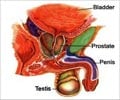Low risk prostate cancer patients have a better chance of receiving expectant therapy at academic centers than in other treatment centers, says Yale study.

- Prostate cancer risk increases with age with at least 14% of men affected with prostate cancer at some point in their life.
- There are many treatment options for men with benign prostate cancer
- The type of treatment received by the patient depends on the type of cancer center visited by the patient.
- It is diagnosed mostly in older men with 6 patients out of 10 over 65 years of age.
- 1 in 7 men will develop prostate cancer at some point in their life.
- It is a serious disease but not everyone dies of prostate cancer.
- 68% of prostate cancer incidence across the world occurs in developed nations.
Expectant Management of Prostate Cancer
Expectant management of prostate cancer is carried out to avoid actively treating insignificant prostate cancer. It is also known as deferred therapy or watchful treatment.
Not all prostate cancer risks are significant to warrant radical prostatectomy. Radical prostatectomy leads to increase in erectile dysfunction and incontinence and adopting expectant management will provide a better quality of life for a patient at low risk for prostate cancer.
There are guidelines that have been put in place to provide patients at low risk for prostate cancer to avail expectant management instead of treatment like hormonal therapy, radiation therapy or even surgery.
The researchers from Yale University studied data of 95,000 men with low risk prostate cancer risk from The National Cancer Database between 2003 and 2014.
- Three fold increased chances of receiving expectant therapy for low risk prostate cancer patients in academic centers (17%) when compared with other cancer treatment centers (8%).
- 12% of the men in the study group were treated using expectant therapy.
- 88% received radiation or surgery.
An associate professor of therapeutic radiology, Dr. James Yu, who is a senior author of the study, “The amount of variation in management highlights the lack of standardized practice in the United States, and leads one to question whether important decisions about cancer care are being made by patients, or are a product of which providers they are seeing. Further research is needed to identify precisely why we are observing these differences in the management of men with prostate cancer.”
Though Dr Lester-Coll couldn’t tell us which was a better method of treatment “The study was not designed to answer this question. We did not look at cancer outcomes. We studied patient and health-care related factors that predicted treatment selection.”, he did highlight reasons why academic centers were more likely to prescribe expectant treatment.
- “academic physicians are more likely to be early adopters of newer practices.
- differences in reimbursement and practice structure models could still account for subtly influencing physicians in treatment preference on a global scale.
- physician specialty and multidisciplinary evaluation are also known to impact the rate of expectant management and likely vary significantly across academic and community cancer centers.
- patient populations at academic centers may be more complex medically and more motivated to seek multiple opinions prior to making informed decisions.”
- Key statistics for prostate cancer - (http://www.cancer.org/cancer/prostatecancer/detailedguide/prostate-cancer-key-statistics)
- Prostate cancer statistics - (http://www.wcrf.org/int/cancer-facts-figures/data-specific-cancers/prostate-cancer-statistics)
- Expectant Management of Prostate Cancer - (http://www.ncbi.nlm.nih.gov/pmc/articles/PMC1508370/)














